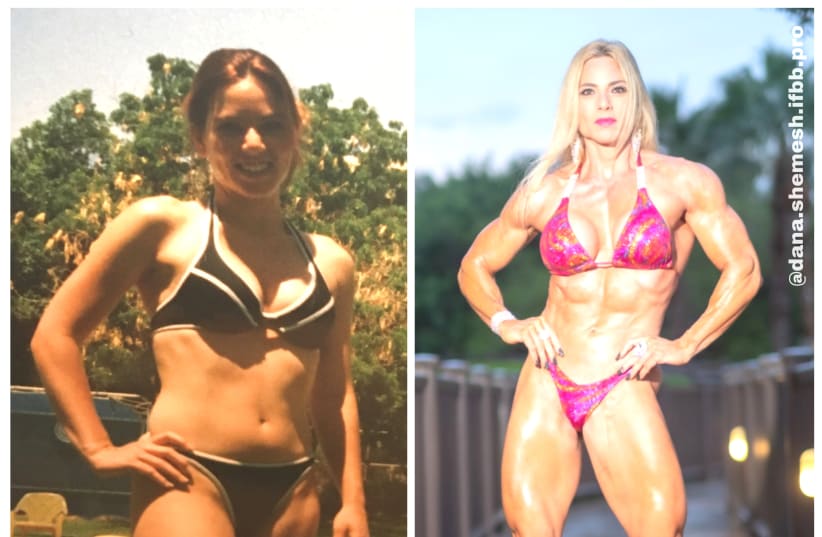Citing age and other reasons, such as having reached her goals of winning first place in multiple IFBB PRO (International Federation of BodyBuilding and Fitness) competitions, Jerusalem-born bodybuilder Dana Shemesh announced her retirement this week at the age of 46.
It all began one fine day, while she was in her late 20s, while Dana was working as a graphic designer in Tel Aviv and her friend took her to see a bodybuilding contest.
Little did she know that show would change her life – she was so taken up by what she saw and from there, things happened quickly. She realized that this was the sport for her and decided to make bodybuilding her lifestyle.
At age 29, she quit smoking and started running and lifting weights for the first time in her life while changing her career to become a personal trainer.
“Everyone said that I was crazy, but I never listened to them. Instead, I followed my heart and did what made me happy.”
Shemesh competed for the first time at age 35 and won first place at a competition in Israel. She noted that even if she hadn’t won, her first competition was still a very defining moment that would encourage her to be consistent and endure.
During IDF service at age 18, she still had an “average” build and although she had played volleyball and other sports prior, she was not accustomed to heavy lifting.
Flash forward in time, ever since that first contest, she has competed in several more, such as the Arnold Classic in Ohio, and has taken first place trophy in a few.
Shemesh moved to the US in 2016 to fulfill her bodybuilding dreams and immediately noticed that America definitely has a bigger lifting culture than Israel.
She also realized that many of her American-born competitors were half her age and started lifting in high school, at age 16 or even 14. She has the distinction of being the first and only Israeli female to have competed in the IFBB PRO.
She now lives in Florida and says that while she has retired from competition, she has not left the sport altogether and will continue to train and coach others to help them achieve their fitness goals.
“Although it is very rewarding and I enjoy doing this, it is definitely challenging” she said. “After all, I made it to the top, and that’s quite an accomplishment.”
Shemesh added that “weightlifting is a great way to stay active and healthy,” and recommends it to anyone looking for a new activity to partake in. She also said that it “is the best anti-aging thing you can do for yourself even if you aren’t going to compete. After all, it’s never too late to change your life, and you’re never too old to improve your health! Everything starts with making a decision and just sticking with it!”
She also mentioned that the COVID-19 pandemic affected the nature of competitions. Specifically, things got difficult as gyms closed, competitions got postponed or canceled, people couldn’t travel etc.
“But we overcame that and I competed in Tampa Pro and Pittsburgh Pro last year despite corona! So, we overcame a lot!
“Bodybuilding will always be part of my life. In 2018, I got my IFBB Pro Card and became the first and the only Israeli female professional bodybuilder! But all athletes regardless of their sport have to retire at some point.”
When asked how much she could bench-press, Shemesh laughed and responded “I don’t usually max-out, since bodybuilding is more about physique than raw strength, but I can do two plates (225 pounds) for reps and 300 for a one-rep max on a good day.”
She commented that in the last 10 years, things have definitely changed.
“Judges nowadays demand a more ‘dry’ physique than before. Also, if you notice, then and now, female bodybuilders have definitely got bigger and more ‘shredded’ than they were in the past."
